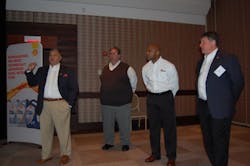WASHINGTON D.C. Shell Lubricants took the wraps off its new “portfolio” of Shell Rotella CK-4 and FA-4 oils diesel engine oils, designed to meet Proposed Category 11 (PC-11) specifications finalized back in February, at a special event in the nation’s capital this week.
Shell’s Rotella T4 Triple Protection 15W-40 and 10W-30, along with T5 Synthetic Blend 10W-30, meet the new CK-4 service category and will become available in August – replacing current lubricant formulas as they are completely backwards compatible with all current engines, though those oils will not be “licensed” as CK-4 on the API donut until Dec. 1.
Chris Guerrero, global HDEO brand manager for Shell Rotella and Shell Rimula, added that FA-4 formulations, which include lower viscosity grades designed to maximize fuel economy in 2017 model year engines, will have limited backwards compatibility because some older engines were not designed to operate with lower viscosity grades. Shell won’t introduce those oils until December.
He added that Shell’s new engine oil “portfolio” will also include a new “multi-vehicle” synthetic blend, Rotella T6 5W-30, for both diesel and gasoline engines that allow CK-4 blends as well as API SN performance standards.
“This oil cut its teeth in the diesel setting; we did that first before seeing if it could work in the gasoline setting,” Guerrero explained.
Other details regarding Shell’s new CK-4 and FA-4 oils include:
- Rotella T Triple Protection is being renamed Rotella T4 Triple Protection, with Rotella T5 Synthetic Blend 10W-30 reengineered as well, to meet the new CK-4 spec.
- Both of these engine oils will be on retail shelves in August but won’t display the API CK-4 donut until Dec. 1; the official date of first license for CK-4 and FA-4 engine oils.
- The Rotella Synthetic Blend 15W-40 and T6 Full Synthetic 5W-40 will also be reformulated to meet CK-4 specifications.
- Rotella T5 Ultra Synthetic Blend 10W-30, which will meet the API FA-4 specification, will be introduced in December.
- The naming structure of Shell’s engine oils – T4 to T5 to T6 – will correspond to a specific “bottle color” to make them easier for customers to identify, with Rotella T4 products in white bottles, Shell Rotella T5 Synthetic Blend products in silver color, and T6 Full Synthetic products in blue bottles, with bottles available in either one-gallon and quart sizes.
- If a truck engine was built prior to 2016, whether on- or off-highway, Shell recommends using CK-4 oil as those blends replace its CJ-4 oils.
- For a 2017 on-highway vehicle, follow the OEM recommendation before changing the oil for the first time to see if they allow FA-4 oil to be used.
Dr. Richard Tucker, general manager-technology for B2B lubricants, stressed that there is a “global trend” towards lower viscosity engine oils in order to reduce fuel consumption and that PC-11 represents “just the starting point” for Shell to further pursue further formulations to that end.
“It’s really just a matter of time before we see wider adoption of FA-4 oils, for the pressure for greater fuel economy and from GHG rules is not going away,” he pointed out.
Dan Arcy, Shell's global OEM technical manager for the Americas, said that based on Shell’s testing of its new oils, there should a 1.5% improvement in fuel economy by switching from current 15W-40 engine oil blends to the new 10W-30 formulations.
But Guerrero noted that the development of PC-11 compliant CK-4 and FA-4 is only the beginning of Shell’s effort to create higher performing engine oils.
“PC-11 is not the finish line for us,” he said. “The real ‘destination’ is creating the most technically advanced Rotella [oils] ever.”
Matt Urbanak, HDEO technology manager, added that Shell is already testing viscosity formulations even lower than the 2.9 level of FA-4 blends.
“The challenge has always been the fear of sacrificing [oil] durability when moving to lower viscosity formulations,” he explained.
That’s why Dr. Jason Brown, global technology manager for heavy duty diesel engine oil (HDEO), said extensive field testing of the new PC-11 oils – efforts that encompassed 40 million miles of on-road prototype formulation testing for its PC-11 family, along with 50,000 hours of off-road testing for its CK-4 product line alone – is critical to winning acceptance from trucking customers.
“Field testing is what drivers the most credible numbers,” he explained. “It helps our customers see directly the benefits [the new oils] bring to their equipment.”
About the Author
Sean Kilcarr
Editor in Chief
Sean Kilcarr is a former longtime FleetOwner senior editor who wrote for the publication from 2000 to 2018. He served as editor-in-chief from 2017 to 2018.

